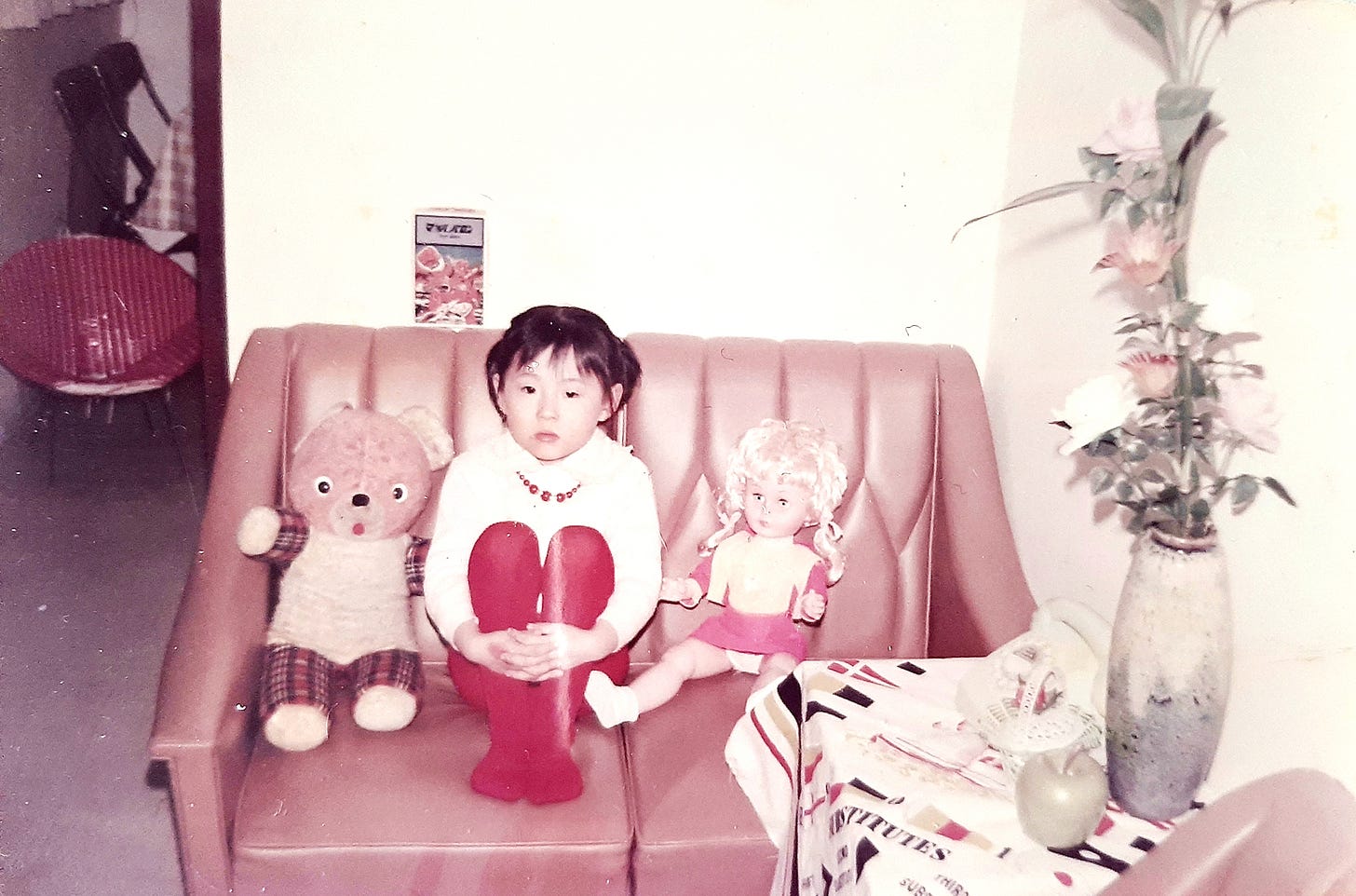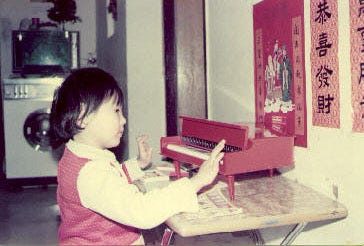Early Years in Monster Building
5. How my family adapted to a modern, capitalistic way of life and my first public humiliation with a foreign language

1976. My mother, older brother and I moved in with Babba in the Quarry Bay area on Hong Kong Island. It was an enclave for new immigrants from China, and where Babba’s buddy Uncle Ding settled. Babba felt right at home in this neighborhood, with plenty of people just like him — overseas Chinese (typically from Southeast Asia) who went to China to contribute to the socialist utopia but were disillusioned and politically repressed during the Cultural Revolution.
The apartment we moved in had one bedroom, a living room, a kitchen and a bathroom. The whole apartment measured around 400 square feet — a big improvement from the 200-square feet unit that our family of five (we plus Grandma) lived in up north in China.
For me and my brother, the apartment felt like a gigantic palace. All four of us shared the same bedroom. At night, as we settled into opposite ends of a flimsy cot placed next to our parents’ bed, we played foot combat until we exhausted ourselves.
It didn’t matter that we suddenly found ourselves in the densest place on earth. We were tiny as ants in the shadow of the Monster Building complex, made up of five low-income tenement buildings closely packed together. It surprised me that this shabby-looking structure became an Instagramable tourist attraction after it was featured in the 2014 Hollywood movie “Transformers: Age of Extinction.” Today, almost 10,000 people live in a total of 2,243 flats. The number might have been smaller when my family lived there.
For my parents, living in such proximity to the thousands of refugees who fled from the political turmoil in China provided a sense of camaraderie and safety rather than claustrophobia. The crowded physical space became the “new normal” and was forever imprinted in my brain.
My mother rejoiced in not having to carry heavy loads of coal up the stairs and make dinner in the same room where we slept. The kitchen was small, but separate and had a stove fueled by liquid gas. Workers would deliver canisters of LP up the elevator. What a far cry from the “primitive” and backward way of life in our hometown.
We had electrical appliances, the kinds that had never seen the light of day in China, except, perhaps, in the houses of top government officials. There was a black-and-white television and a front-loader washing machine in our living room.
It was that black-and-white television that taught me how to speak Cantonese, the language spoken in our new hometown. The very first program I watched was “Tarzan.” It was an American import, but the dialogues were dubbed in Cantonese. The actor could have been Ron Ely, but I don’t know for sure. All I remember is that I was awe-struck by this muscular man in loin cloth hanging from tree to tree and making funny noises in a jungle. My brother and I imitated his cry, “Ohhh-ooooh-oohhh-oh-oh-ooh-oh!” for fun. Those cries were probably the first “Cantonese” I learned.
School didn’t start for me until the following year. Somehow, my mother’s plan for me to get a kickstart in the local school system didn’t happen. In hindsight, it was a stroke of luck. This was probably the year time flowed most slowly and sweetly in my entire life.
Besides watching TV, another favorite pastime was gazing at the washing machine. I was often transported to a trance state as it spinned. I imagined crazy things happening inside the spinning drum. Were there little spirits among the clothes? Did they run as fast as they could to keep the machine spinning?
When the screeching noise of the machine came to a halt, Mamma would pop open the round glass door, pull out the laundry and hang them outside the window on long bamboo sticks.
“One day you’ll grow up and help me with all these chores,” she said, moving swiftly into the kitchen, placed a giant black wok on the stove and lit the flame.
I didn’t really know what she meant by “growing up.” But I learned very quickly that it was what Mamma and all the adults wanted me and my brother to do. “Grow up and get tall fast,” they would say, as if it was a blessing.
Soon, the idea of growing up became tied to the idea of helping Mamma and Babba with their busy work. Later, much later, I found out that growing up had to do with earning money. It seemed my parents were always in a hurry. They wanted us to grow up in a hurry too. They needed to feed us, pay for the flat and every little thing in our new home. Things weren’t cheap in this capitalistic city. Everything cost money, and every inch of space was measured in gold.
As Mamma made fried rice in the kitchen, I went to the little foldable table where my wooden toy piano and coloring books were. I had the room to myself. Babba was at work and big brother was at kindergarten.
I started poking my fingers on the black and white keys. It made wonderful “ding, ding, ding” sounds. I was mesmerized. “Ding, ding, ding, dingding!” I couldn’t stop. I tried different key combinations to see what would come out, and I would do this over and over.
“Ah Mei!” my mom yelled from the kitchen, in Hangzhouese. “Time to eat!”
I reluctantly peeled my fingers off the magical keys while Mamma placed the piano on the floor so we could free up the table for lunch.

Our way of life was a big leap from the poverty-stricken one in China. Mamma and Babba must have been very proud of their accomplishments in such a short time. No more waiting in line at 4 a.m. to get a piece of meat with government-issued ration coupons. No more saving the flesh of apples for us while they ate the peel. There was a material abundance that they had never dreamt of. Crossing the border was the big miracle that made this possible.
But the mere act of immigration wasn’t enough. To get all these material things, Babba and Mamma had to work constantly. Babba worked at a textile factory, designing patterns called “repeats.” He was good at it, as he had done this for a long time back in China. He would come home at night and sometimes he would miss dinner.
Mamma took home a bunch of doll’s clothes and sewed snap buttons on them. Her neighbors told her about this gig and she snapped it up right away. It was what most housewives did at the time, at least in the community where we lived. Nobody was rich. Extra income was always welcome. Working from home also solved the problem of childcare, as Grandma was still in China and no one else could watch over me during the day.
During this first year in Hong Kong, I enjoyed having toys instead of chicken shit to play with. And I had time to explore interesting things without having to go to school and perform.
Things started to change rapidly from the day I stepped into kindergarten. According to my mom, I didn’t cry like my brother did when she left me there on the first day. I didn’t know if that was a good thing, but she made it out to be so. Like it was something I should be proud of.
I was 5 and stupefied. There were about 30 kids in my classroom, and many more on the same floor. My homeroom teacher, Miss Chung, was tall and lanky. She seemed kind and strict at the same time.
As a latecomer, I had to learn everything from scratch, such as the 26 English alphabets, the Arabic numbers, and countless Chinese characters.
We were told to write the English alphabets on square grids in a notebook. I struggled with forming the right shapes. One day, I started to use a ruler to draw the horizontal lines of all the Ts on the same row. I would draw a line across the page with little spaces in between. That helped me finish the exercise more quickly than my classmates. The letters also turned out to resemble more closely the example printed on the page. A sense of pride bubbled up inside.
When my teacher saw what I was doing, she scolded me for cheating. She told me to erase everything I had done and start over. That was my first public humiliation.
I also had to learn how to write Chinese characters in another class. I did the same ruler trick with the characters “two” and “three,” as they were made up of two horizontal strokes (二)and three horizontal strokes (三), respectively. Needless to say, I was scolded again for cheating.
I realized I had to put in the hard work and couldn’t get away with the ingenious shortcut I came up with.
Toward the end of the school year, our teacher told us to bring back a textbook from the last school term. I went home and found the book but noticed there were holes on some of the pages. My heart pounded heavily in my chest. Horrified, I started crying.
When Mamma noticed my tears, her face tightened. “Don’t cry! Let’s fix this.”
She immediately launched into problem-solving mode and rummaged through a cardboard box filled with my and my brother’s old textbooks and notebooks.
“Here, isn’t this a picture you cut out from the book?”
“Yes, yes,” I said, still sobbing.
“Okay, let’s use some transparent tape and paste it back,” Mamma said.
I nodded.
When we were done, there was still a gaping hole in the middle of the page. It was so obviously flawed, that my heart sank in despair.
What should I tell my teacher? Would she scold me? Would she stop me from progressing onto the next class? My worries kept circling in my little head all night long.
The next morning, when it was my turn, I handed the fixed-up textbook to Miss Chung and pointed out the hole on the page.
“I’m sorry, Miss Chung! I can’t find that picture no matter what. Please don’t punish me!” Tears were welling up and about to drop from the corners of my eyes.
Suddenly, Miss Chung’s serious face relaxed into a smile, followed by a giggle.
“Silly girl! I didn’t ask you to bring back an old textbook,” she said. “I just wanted you to bring your exercise book to class so we can work on it today.”
Words failed me. My head started spinning. I was so confused. My face turned hot.
“You have misunderstood what I said,” Miss Chung said.
Misunderstood? I was even more confused.
“Perhaps it was the language,” I thought. For the first time, I realized that my understanding of Cantonese wasn’t good enough to keep me out of trouble. We spoke Mandarin and Hangzhouese at home. It was like going to another country every time I went to school.
That was my public humiliation No. 2.
When I returned home, I decided to watch more “Tarzan” and other TV series whenever I had a chance. I wanted to speak Cantonese just like everyone else did at school.
This is the 5th installment of my “Memoirish” series. Click here for the 4th installment, “Stepping onto British Soil.”







Beautifully written and an fascinating story. Your truly a fantastic storyteller ♥️❤️ can't wait to read the next installment!
I so enjoyed this glimpse of your early years in Hong Kong. You told it so vividly I felt like I was right there with you, fascinated with everything (my younger daughter was also mesmerized by the spinning washing machine when she was very little!) and I really felt for you with the public humiliations. I am glad your teacher turned out to be kind, and that your mother helped you the best she could with the holes in the pages of your textbook. We suffer so as young children--more than we remember! I loved the photos of you, too. So sweet!